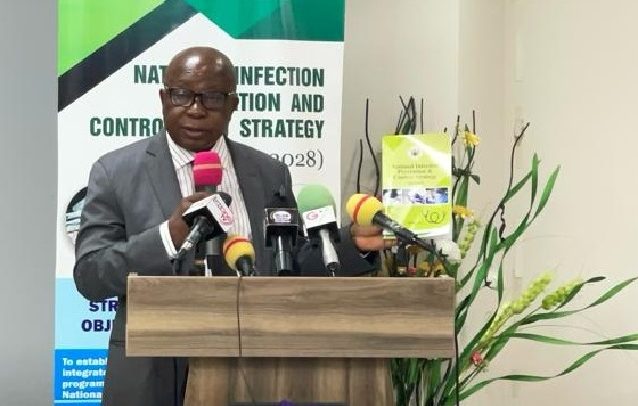
Ms.Tina Mensah(second from left) and Dr. Anthony Nsiah-Asare at the World TB day Launch.With them is Dr. Frank Bonsu.Photo Victor A. Buxton
The National Tuberculosis (TB) Control Programme's (NTP) monitoring indicators within the last five years have shown warning signs that Ghana's success gained in the control of TB infections among the public can be halted and reversed.
Dr Frank Bonsu, Programmes Manager for the NTP who said this at the commemoration of the World TB Day in Accra yesterday stated that the gains achieved would be eroded if the right leadership and commitment are not provided in support of TB control.
He said there has been a decline in the notification of TB cases over the years as the nation in 2017 recorded 14,550 new cases.
"Annually, the expected number of reported TB cases country wide is 44,000 on the average, but last year for instance there was decline in TB reported cases in every region with the exception of Western, Upper East and Brong Ahafo regions," he said.
He said the lack of financing mechanism to support the treatment adherence by patients has also contributed to the retrogression of progress made.
"The national treatment success average is 85.2 per cent and falls short of Ghana's set targets of 90 per cent," he said.
Dr Bonsu observed that though a new intervention on intensified TB case finding has been introduced at hospitals Out patients depts, screening was in not sufficiently done in some facilities
He said the remarkable passion and drive by health care providers working in TB control was not palpable any more.
He said the NTP would within this year roll out the first every child-friendly pediatric formulation for treating TB in children and a newer shorter treatment regimen for Multi Drug Resistant TB.
Dr Bonsu noted that the NTP had started deploying GeneXpert alert systems to improve drug resistant TB diagnosis and management.
The Deputy Minister for Health, Ms Tina Mensah reiterated the government's commitment to ending TB in Ghana by 2030 through collaborations.
She said Ghana had developed a health sector strategic response to end TB in line with the global blueprint to arrest the global TB situation.
She lauded the Ghana Journalists Association and the media for their support and contribution to the TB free Ghana campaign.
The World Health Organisation Country Representative, Dr Owen Laws Kaluwa, for his part called on the government to invest more finances into TB control programmes in Ghana to enable it attain its set targets.
The President of the Ghana Journalists Association (GJA), Mr Roland Affail Monney encouraged journalists to prioritise TB control in their reports.
He asked journalists to report and educate the public on the myths, misconceptions and stigmas on TB.
Read Full Story


























Facebook
Twitter
Pinterest
Instagram
Google+
YouTube
LinkedIn
RSS